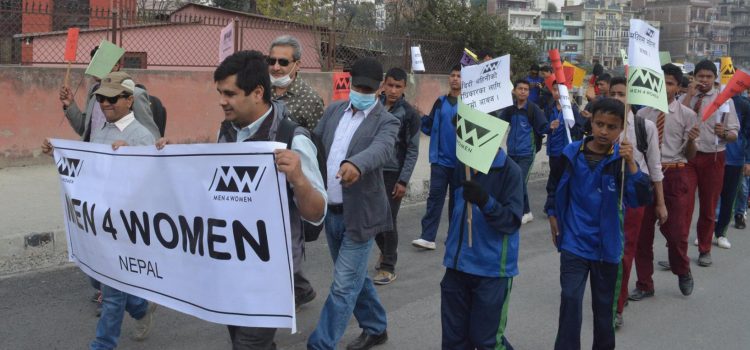Celebration of Women’s Day every year across the globe is a common phenomenon. Demands as respect women, provide equal rights and no discrimination, among others are the slogans contextualizing the country status. The observation ranges from seminar to rallies, talk show to demonstration bearing somehow similar style.
Breaking the traditional approach, more than 20 organizations including Freedom Forum and NEFEJ this year (March 8) gathered 400 plus men and organized a men-only march named ‘Men for Women’ where the men were distributed sanitary pads used by women during their monthly cycle. There were neither lectures nor the presentation of working papers, but the sanitary pads prodding males to realize the biological phenomenon of women and the cooperation men could extend for their health and rights.
Former Chief Justice Kalyan Shrestha inaugurated the march from Maitighar-Mandala. Addressing briefly to the participants carrying placards and banners, he said, “Irrespective of the change brought forth by the science and technology, and the modernity implemented in Nepalis’ life, the violence against women is so disgracing.” He underscored that time had come for all to work in unison to end gender discrimination and violence. According to him, such rally gathering people from diverse sectors could create awareness on women’s rights and men’s role for women empowerment.

The former Chief Justice however said man is not synonymous to violence against women.
The march begun from Maitighar-Mandala went to Shantibatika carrying placards and banner that were telling men folks to be aware of women’s problems. The slogans in the placards were urging the male to pay attention and play active role to ease the lives of women.
Sanitary pads were symbolic message that men should change their patriarchal attitude toward women and embolden society to shed the stigma.
The march got massive media coverage. Freedom Forum had also made substantial social media publicity of the program.
The growing number of people and the organizations as compared to the rally last year shows that issue- men’s engagement for women- is getting pertinent. The M4W campaign is indeed a collaborative approach to realize women’s empowerment and the change society by challenging the ingrained stereotype. If such program is expanded to the provincial level, it is likely to garner wider support for nationwide awareness and movement.



